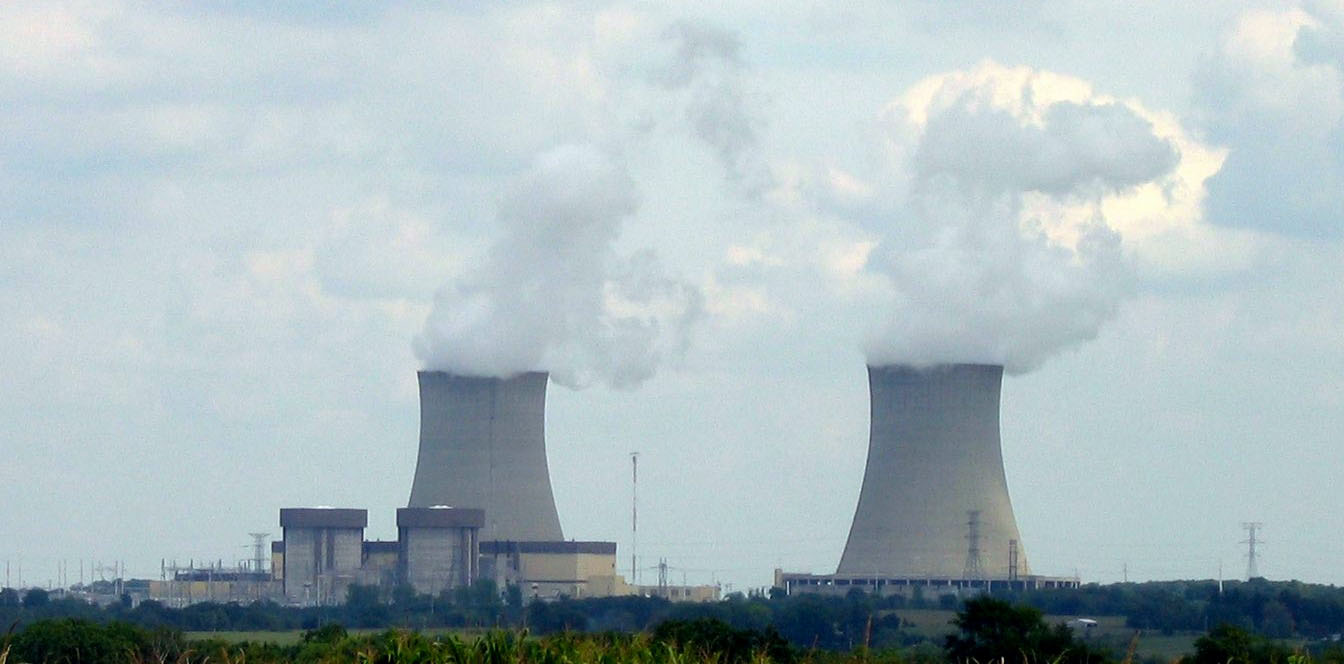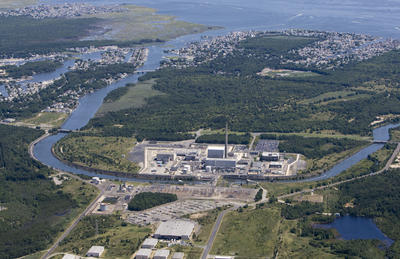
Yesterday, in our post about three nuclear industry victories–but a long-term and continuing trend that forecasts trouble for the nuclear and fossil fuel industries–we wrote: “The PJM power grid, which covers 61 million customers from the mid-Atlantic to Illinois, held its 2017-18 power auction and procured 167,004 megawatts of capacity resources at a base price of $120, a whopping increase from the $59.37 base it bought at last year’s auction. That’s good news for Exelon and its troubled nuclear reactors and bad news for ratepayers in the region.”
Well, at double the price for electricity as last year’s auction, it seemed on the surface like it would be good news for Exelon. But later in the day, after we posted the story, the news emerged that five Exelon reactors were shut out of the auction entirely–Byron-1 and 2 and Quad Cities-1 and -2 in Illinois and Oyster Creek in New Jersey. These reactors couldn’t meet that price and their electricity just isn’t needed.
And that is decidedly not good news for Exelon.
Here’s how Crain’s, ChicagoBusiness.com, headlined their story: Financial outlook craters for two Exelon nukes in Illinois. Note that when Crain’s says “two” nukes, they mean two sites with four reactors. The Chicago Tribune was only slightly more reserved: Auction results place Exelon power plants in jeopardy ran their headline. Both papers also noted that Exelon’s Clinton reactor, which is not in the PJM grid, is in serious financial trouble as well–“on the chopping block” is how Crain’s described the reactor.

The news probably does herald an early end for Oyster Creek, which is scheduled to close in 2019 anyway. Any combination of increased costs or decreased sales would likely lead to early shutdown, and Oyster Creek faces both.
The situation in Illinois is murkier. Exelon could still try to sell electricity from its Illinois reactors in later “incremental” auctions, but that isn’t likely to prove successful. Said Crain’s, “The results of PJM’s auction lay it out plainly for Illinois: Byron and Quad Cities aren’t needed to keep the lights on. PJM’s first job is to ensure reliable delivery of power when it’s needed most, and the grid operator certified there’s enough available to do that without Byron and Quad Cities.”
So, while denying that it wants a bailout (although that is exactly what it is seeking), Exelon clearly will rely on state legislative action to keep its reactors operating–and some in the legislature already are jumping to do the company’s bidding, even though the reactors are not needed and their power is too expensive. As the Tribune article reported, “The reality is now it’s up to the state to choose what they want to do. Clearly they’re out of the money. It’s up to the state to decide if they want to keep these assets running or not,” said Julien Dumoulin-Smith, executive director for U.S. electric utilities for UBS Investment Research.
According to Crain’s,
“It will be up to state lawmakers, and whoever emerges as governor next year, to decide whether ratepayers should pay more on top of the $120 per megawatt-day to keep the plants open despite the fact that they’re apparently not needed….
“The lost PJM revenue at the two Exelon plants turns up the heat on what’s shaping up as a large-scale effort next year in Springfield to save the facilities, which support hundreds of union jobs and contribute millions in local taxes to nearby communities. That legislation, which hasn’t yet been introduced, is likely to increase Chicago-area electric bills.
Late last week, House Speaker Michael Madigan, D-Chicago, and House GOP leader Jim Durkin, R-Western Springs, signaled their strong backing of doing what it takes to keep Exelon’s plants open by introducing a resolution to that effect. The resolution calls on state and federal agencies to do what they can to keep the plants open.”
The Tribune added that the resolution–one of the most overtly nuclear for the sake of nuclear pieces of legislation we’ve ever seen–would ask “three state regulatory bodies to prepare reports that would be beneficial to Exelon’s lobbying efforts if it pushes legislation in the future. Among them: An Illinois EPA report that explains the “societal cost” of increased greenhouse gas emission in the state if nuclear plants close and a report from the Department of Commerce and Economic Opportunity that look at job losses that would come from closing those plants.”
A threatened Memorial Day vote on the resolution didn’t materialize, and as a resolution rather than law, the measure doesn’t actually require anything; but the intent is clear.
Exelon argues that keeping the reactors open would be essential to enable Illinois to meet greenhouse gas emissions reductions expected to be required by the federal Environmental Protection Agency in new proposed rules that will be released on Monday. This is despite the fact that a chief competitor to Exelon in Illinois is lower-cost and cleaner wind energy sweeping into the state from across the Midwest.
The new EPA rules are indeed expected to put the onus on states to meet new carbon standards, and may include some incentives for nuclear power. If so, we will report on those when they are released (and, in any case, NIRS is preparing new actions on the nukes/climate issue–if you’re on our e-mail Alert list, expect an important message next week).
Crain’s predicts an all-out effort by some in the legislature next year to bailout Exelon even if that term is anathema to the utility.
“Exelon’s Mr. Crane has maintained that he’s not seeking a “bailout” from the state, and that the company is seeking ‘market-based’ solutions to its nuclear woes….Observers expect the General Assembly next year to seek to provide financial assistance to Exelon’s nukes as part of a comprehensive carbon-reduction plan. Exelon could then argue that the assistance doesn’t amount to a bailout, since it’s part of a federally mandated plan.”
We predict an all-out campaign against any such legislation and in favor of new support for clean energy to replace Exelon’s aging, overly-expensive reactors. While environmentalists can’t match Exelon’s spending, with sufficient effort we can overwhelm them with public opposition. But it won’t be easy: people in Illinois should be laying the groundwork now–talking with and educating neighbors, colleagues, church and civic groups and the like. Make sure people are on NIRS’ e-mail Alert list, and/or lists of Illinois groups. The stakes are high: Illinois’ energy future–indeed, potentially the future of nuclear power in the U.S.–may well be determined by what happens next in the nation’s most nuclear state.
Michael Mariotte
May 28, 2014
Permalink: https://www.nirs.org/2014/05/28/exelon-loses-big/
You can now support GreenWorld with your tax-deductible contribution on our new donation page here. PayPal now accepted. We gratefully appreciate every donation of any size–your support is what makes our work possible.
Comments are welcome on all GreenWorld posts! Say your piece above. Start a discussion. Don’t be shy; this blog is for you.
If you like GreenWorld, you can help us reach more people. Just use the icons below to “like” our posts and to share them on the various social networking sites you use. And if you don’t like GreenWorld, please let us know that too. Send an e-mail with your comments/complaints/compliments to nirs@nirs.org. Thank you!
Note: If you’d like to receive GreenWorld via e-mail daily, send your name and e-mail address to nirs@nirs.org and we’ll send you an invitation. Note that the invitation will come from a GreenWorld@wordpress.com address and not a nirs.org address, so watch for it.



